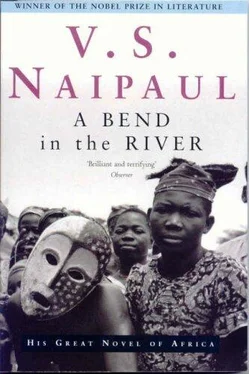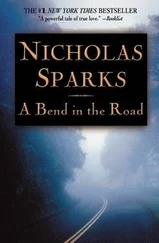V. Naipaul - A bend in the river
Здесь есть возможность читать онлайн «V. Naipaul - A bend in the river» весь текст электронной книги совершенно бесплатно (целиком полную версию без сокращений). В некоторых случаях можно слушать аудио, скачать через торрент в формате fb2 и присутствует краткое содержание. Год выпуска: 1989, ISBN: 1989, Издательство: Vintage, Жанр: Современная проза, на английском языке. Описание произведения, (предисловие) а так же отзывы посетителей доступны на портале библиотеки ЛибКат.
- Название:A bend in the river
- Автор:
- Издательство:Vintage
- Жанр:
- Год:1989
- ISBN:978-0679722021
- Рейтинг книги:5 / 5. Голосов: 1
-
Избранное:Добавить в избранное
- Отзывы:
-
Ваша оценка:
- 100
- 1
- 2
- 3
- 4
- 5
A bend in the river: краткое содержание, описание и аннотация
Предлагаем к чтению аннотацию, описание, краткое содержание или предисловие (зависит от того, что написал сам автор книги «A bend in the river»). Если вы не нашли необходимую информацию о книге — напишите в комментариях, мы постараемся отыскать её.
) V.S. Naipaul takes us deeply into the life of one man—an Indian who, uprooted by the bloody tides of Third World history, has come to live in an isolated town at the bend of a great river in a newly independent African nation. Naipaul gives us the most convincing and disturbing vision yet of what happens in a place caught between the dangerously alluring modern world and its own tenacious past and traditions.
A bend in the river — читать онлайн бесплатно полную книгу (весь текст) целиком
Ниже представлен текст книги, разбитый по страницам. Система сохранения места последней прочитанной страницы, позволяет с удобством читать онлайн бесплатно книгу «A bend in the river», без необходимости каждый раз заново искать на чём Вы остановились. Поставьте закладку, и сможете в любой момент перейти на страницу, на которой закончили чтение.
Интервал:
Закладка:
In the end I didn't telephone Mahesh; I thought I would write him later. Security at the docks the next morning wasn't extraordinary. But the officials were tense. They were like people with a job to do; and that was to my advantage. They were less interested in a foreigner who was leaving than in the African strangers in the market encampment around the monument and the dock gates. Still, I was constantly stopped. A woman official said, when she gave me back my papers, "Why are you leaving today? The President is coming this afternoon. Wouldn't you like to see him?" She was a local woman. Was there irony in her voice? I was careful to take all irony out of mine. I said, "I would like to, citizen. But I have to go." She smiled and waved me on. At last I went aboard the steamer. It was hot in my _cabine de luxe__. The door faced the river, which dazzled; and the sun fell on the deck. I went around to the shaded side, which overlooked the quay. That wasn't a good idea. A soldier on the quay began to gesture at me. Our eyes met, and he began to scramble up the gangway. I thought: I mustn't be alone with him. I must have witnesses. I went down to the bar. The barman was standing in front of his empty shelves. A fat man with big, smooth arms, a steamer official of some sort, was drinking at a table. I sat at a table in the centre, and the soldier soon appeared in the doorway. He remained there for a while, nervous of the fat man. But then, overcoming his nervousness, he came to my table, leaned over and whispered, "_C'est moi qui a r��otre affaire__. I fixed it for you." It was a smiling request for money, from a man who might soon have to fight a battle. I did nothing; the fat man stared. The soldier felt the fat man's stare and began to back away, smiling, saying with his gestures that I was to forget his request. But I took care after that not to show myself. We left at about midday. The passenger barge was not towed behind these days--that was now considered a colonial practice. Instead, the barge was lashed to the forward part of the steamer. The town was soon past. But for some miles that bank, though overgrown, still showed where in colonial days people had laid out estates and built great houses. After the morning heat it had turned stormy, and in the silver storm light the overgrown, bushy bank was brilliant green against the black sky. Below this brilliant green the earth was bright red. The wind blew, and ruffled away reflections from the river surface near the bank. But the rain that followed didn't last long; we sailed out of it. Soon we were moving through real forest. Every now and then we passed a village, and market dugouts poled out to meet us. It was like that all through the heavy afternoon. The sky hazed over, and the sinking sun showed orange and was reflected in a broken golden line in the muddy water. Then we sailed into a golden glow. There was a village ahead--you could tell from the dugouts in the distance. In this light the silhouettes of the dugouts and the people in them were blurred, not sharp. But these dugouts, when we came to them, had no produce to sell. They were desperate only to be tied up to the steamer. They were in flight from the riverbanks. They jammed and jostled against the sides of the steamer and the barge, and many were swamped. Water hyacinths pushed up in the narrow space between the steamer and the barge. We went on. Darkness fell. It was in this darkness that abruptly, with many loud noises, we stopped. There were shouts from the barge, the dugouts with us, and from many parts of the steamer. Young men with guns had boarded the steamer and tried to take her over. But they had failed; one young man was bleeding on the bridge above us. The fat man, the captain, remained in charge of his vessel. We learned that later. At the time what we saw was the steamer searchlight, playing on the riverbank, playing on the passenger barge, which had snapped loose and was drifting at an angle through the water hyacinths at the edge of the river. The searchlight lit up the barge passengers, who, behind bars and wire guards, as yet scarcely seemed to understand that they were adrift. Then there were gunshots. The searchlight was turned off; the barge was no longer to be seen. The steamer started up again and moved without lights down the river, away from the area of battle. The air would have been full of moths and flying insects. The searchlight, while it was on, had shown thousands, white in the white light.
July 1977 - August 1978
ABOUT THE AUTHOR
Vidiadhar Surajprasad Naipaul, one of the most highly acclaimed writers in the English language today, was born in Trinidad to Indian parents on August 17, 1932. His grandfather was a Hindu from northern India who migrated to the Caribbean as an indentured laborer; his father was a journalist who inspired the young Naipaul in his future vocation. "At really quite an early age I thought of myself as a writer... because of this overwhelming idea of its nobility as a calling," he remembers. In 1938 the family settled in Port of Spain, where Naipaul attended the island's leading primary and secondary schools. At the age of eighteen he immigrated to England with a scholarship to University College, Oxford. After earning a degree in English literature in 1953 he moved to London to edit _Caribbean Voices__, a BBC radio program broadcast to the West Indies. Naipaul's writing career began auspiciously with the publication of _The Mystic Masseur__ in 1957. A picaresque novel about an engaging con man who becomes a respected Trinidadian statesman, the book was awarded the John Llewellyn Rhys Memorial Prize. _The Suffrage of Elvira__ (1958) and _Miguel Street__ (1959), a collection of short stories that won the Somerset Maugham Award, also exposed the follies of West Indian society. The appearance of _A House for Mr. Biswas__ (1961), a tragicomic novel reminiscent of Dickens, marked a turning point in Naipaul's work. Widely regarded as his masterpiece, the book is a fictionalized account of his father's life that doubles as an allegory of the colonial predicament. _Mr. Stone and the Knights Companion__ (1963), his first novel to be set in England, earned him the Hawthornden Prize. Naipaul began his series of studies of the emerging nations of the postcolonial world with _The Middle Passage__ (1962). Cast in the form of a travelogue, the book records impressions of British, French, and Dutch societies in the West Indies and South America. Following a year-long journey to India, he wrote _An Area of Darkness__ (1964), a controversial portrayal of his ancestral homeland. Afterward Naipaul alternated between fiction and nonfiction in his exploration of cultural identity. In 1967 he brought out _The Mimic Men__, a powerful novel about the consequences of British imperialism that earned him the W. H. Smith Award, and _A Flag on the Island__, a second collection of short stories. Next he searched out the origins of modern Trinidad in a highly personal history, _The Loss of El Dorado__ (1969). _In a Free State__, an innovative work about British expatriates in a strife-torn African nation, won England's prestigious Booker Prize in 1971. _The Overcrowded Barracoon and Other Articles__, a compilation of personal and political journalism, came out the following year. The publication of _Guerrillas__ (1975), a haunting novel of murder and revolution on a Caribbean island recently liberated from colonial rule, firmly established Naipaul's reputation in the United States. After revisiting India during the state of emergency in 1975, he offered another unsettling look at the subcontinent in _India: A Wounded Civilization__ (1977). In 1979 he published _A Bend in the River__, a profound novel that delves still deeper into his recurring theme of displacement in a neocolonial world. During the 1980s Naipaul focused mainly on nonfiction. He turned out a compendium of essays, _The Return of Eva Peron, with the Killings in Trinidad__ (1980); _Among the Believers: An Islamic Journey__ (1981), a searching examination of the Islamic revival in Iran, Pakistan, Malaysia, and Indonesia; and _Finding the Center Two Narratives__ (1984), an autobiographical essay and an essay on the Ivory Coast. _The Enigma of Arrival__ (1987), his only novel of the decade, is perhaps his most autobiographical. In addition he wrote _A Turn in the South__ (1989), a journal of his travels through the American South. He was knighted by Queen Elizabeth II in 1990; the same year he published _India: A Million Mutinies Now__, a more optimistic vision of the modern-day nation. In 1993 he won the David Cohen British Literature Prize. Naipaul's most recent novel, _A Way in the World__ (1994), is an inventive mixture of autobiography and meditation, a monumental tale of identity recovered. "For sheer abundance of talent there can hardly be a writer alive who surpasses V. S. Naipaul," hailed _The New York Times Book Review__. "[He is] the world's writer, a master of language and perception."
Читать дальшеИнтервал:
Закладка:
Похожие книги на «A bend in the river»
Представляем Вашему вниманию похожие книги на «A bend in the river» списком для выбора. Мы отобрали схожую по названию и смыслу литературу в надежде предоставить читателям больше вариантов отыскать новые, интересные, ещё непрочитанные произведения.
Обсуждение, отзывы о книге «A bend in the river» и просто собственные мнения читателей. Оставьте ваши комментарии, напишите, что Вы думаете о произведении, его смысле или главных героях. Укажите что конкретно понравилось, а что нет, и почему Вы так считаете.












